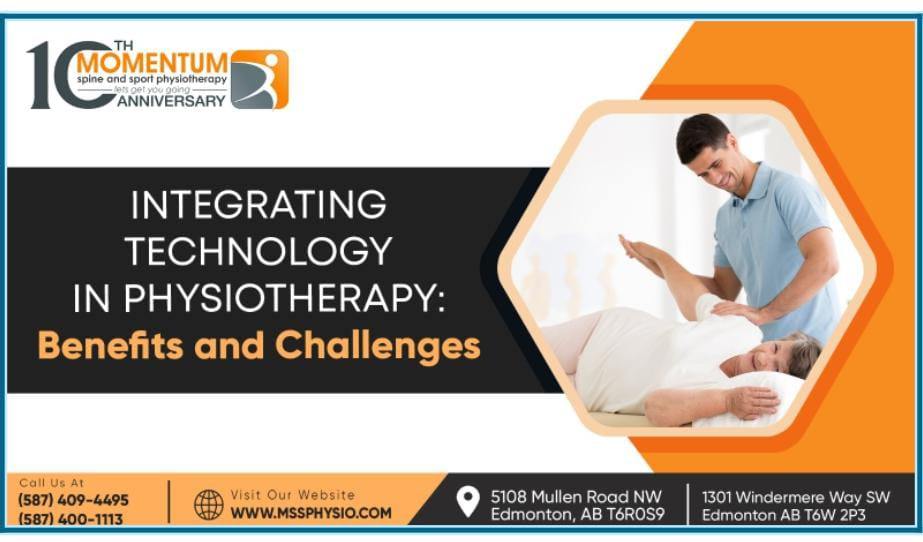In the modern landscape of healthcare, physiotherapy near Edmonton has embraced the integration of cutting-edge technology. This evolution brings a plethora of benefits to patients and practitioners alike, offering innovative solutions at Momentum Physiotherapy and beyond. Yet, it's not without its hurdles. When you browse for “physiotherapy near me,” consider these technological advancements. Here's an exploration of the multifaceted impact of technology on the physiotherapy domain.
Embracing Digital Advancements
At the forefront of innovation, physiotherapy clinics near Edmonton are leveraging digital tools to enhance diagnostics and treatment. From virtual reality that simulates environments for rehabilitation to AI-driven analytics for personalized care plans, technology is reshaping recovery journeys.
Benefits of Technology in Physiotherapy
Enhanced Diagnostic Tools
Precision and Accuracy: Advanced diagnostic tools, such as digital gait analysis and motion capture systems, provide physiotherapists with precise data about a patient's movement patterns and postural alignment. This level of detail aids in crafting highly accurate and individualized treatment plans.
Real-Time Feedback for Patients
Motivation through Monitoring: Wearable technology and mobile applications offer real-time feedback on performance and progress. This can motivate patients by allowing them to see tangible improvements, keeping them engaged in their rehabilitation journey.
Telehealth Services
Accessibility and Convenience: Tele-rehabilitation services break down geographical barriers, allowing patients to receive guidance and support from the comfort of their own homes. This is particularly beneficial for those in remote areas or with mobility challenges.
Data-Driven Treatments
Informed Decision-Making: The ability to collect and analyze large volumes of data enables physiotherapists to make evidence-based decisions. This data can identify trends, predict outcomes, and optimize treatment effectiveness.
Digital Home Exercise Programs
Continuity of Care: Apps that guide patients through exercises at home can help ensure they continue their rehabilitation effectively between sessions, fostering a consistent and integrated approach to care.
Challenges and Considerations
Keeping Up with Rapid Advancements
Continuous Learning: The fast pace of technological advancements means that physiotherapists must commit to lifelong learning to stay current. This can be both a time and financial investment that not all practitioners are ready to make.
Initial Costs
Financial Investment: The upfront cost of new technologies can be significant. Clinics must balance the benefits of cutting-edge tools with the financial realities and return on investment.
Integration with Existing Systems
Compatibility Issues: Integrating new technologies with existing healthcare systems can be complex. Challenges include ensuring interoperability, maintaining patient records accurately, and managing different platforms efficiently.
Patient-Technology Interface
Usability: Not all patients are tech-savvy. The technology used in physiotherapy must be user-friendly to ensure that it doesn't become a barrier to treatment. Simplifying interfaces and providing clear instructions are essential for successful adoption.
Ethical Considerations
Patient Privacy: With the increase in data collection comes the responsibility to protect patient privacy. It is crucial to establish robust cybersecurity measures to maintain trust and confidentiality.
Reimbursement Policies
Insurance Coverage: Not all insurance policies cover treatments that use new technologies. Clinics must navigate and advocate for policies that recognize the value of tech-enhanced physiotherapy for it to be accessible to more patients.
Dependence on Technology
Risk of over-reliance: There is a risk that both patients and therapists may become overly reliant on technology, which could potentially undermine the importance of hands-on, personalized care.
Training and Support
Operational Challenges: Implementing new technologies requires thorough training for staff, ongoing technical support, and periodic updates, all of which can be resource-intensive.
Technology Maintenance
Upkeep and Updates: Keeping technology functioning optimally involves regular maintenance and updates, which can lead to operational downtime and additional costs.
Overcoming Barriers to Technology Adoption
Addressing Resistance to Change
Embracing Innovation: While the integration of technology in physiotherapy practices in Edmonton offers a plethora of benefits, practitioners often face resistance to change. This can stem from a lack of familiarity with new tools or a preference for traditional methods. To overcome this, physiotherapy clinics can prioritize continuous education and hands-on training for staff, ensuring they are comfortable and skilled in utilizing new technologies.
Economic Considerations
Making It Cost-Effective: The initial cost of technology can be a significant barrier. Strategies to address this include seeking partnerships with tech companies, applying for grants, or adopting a phased approach to technology integration. By demonstrating long-term cost savings and improved patient outcomes, physiotherapy clinics can justify the investment to stakeholders and patients alike.
Accessibility and Inclusivity
Bridging the Digital Divide: It's essential that the adoption of technology in physiotherapy doesn't leave behind patients with limited access to digital tools. Clinics can offer rental programs for devices, provide services at a sliding scale, and ensure that technology-enhanced services are complemented by traditional options.
The Role of Physiotherapy
At Momentum Physiotherapy Edmonton, there's a commitment to harnessing technology while navigating its challenges. By integrating state-of-the-art tools and training professionals in cutting-edge techniques, the clinic is a quality, tech-driven Edmonton physiotherapy institution offering quality service to its patients.
In conclusion, the integration of technology in physiotherapy near Edmonton presents an exciting frontier with the potential to revolutionize patient care. While the challenges are non-trivial, the concerted efforts of institutions like Momentum Physiotherapy are aiding in transforming these innovative tools into tangible benefits for patients and setting the course for a smooth journey in the future of rehabilitative care.


